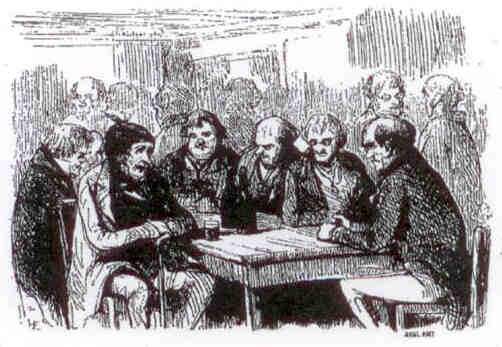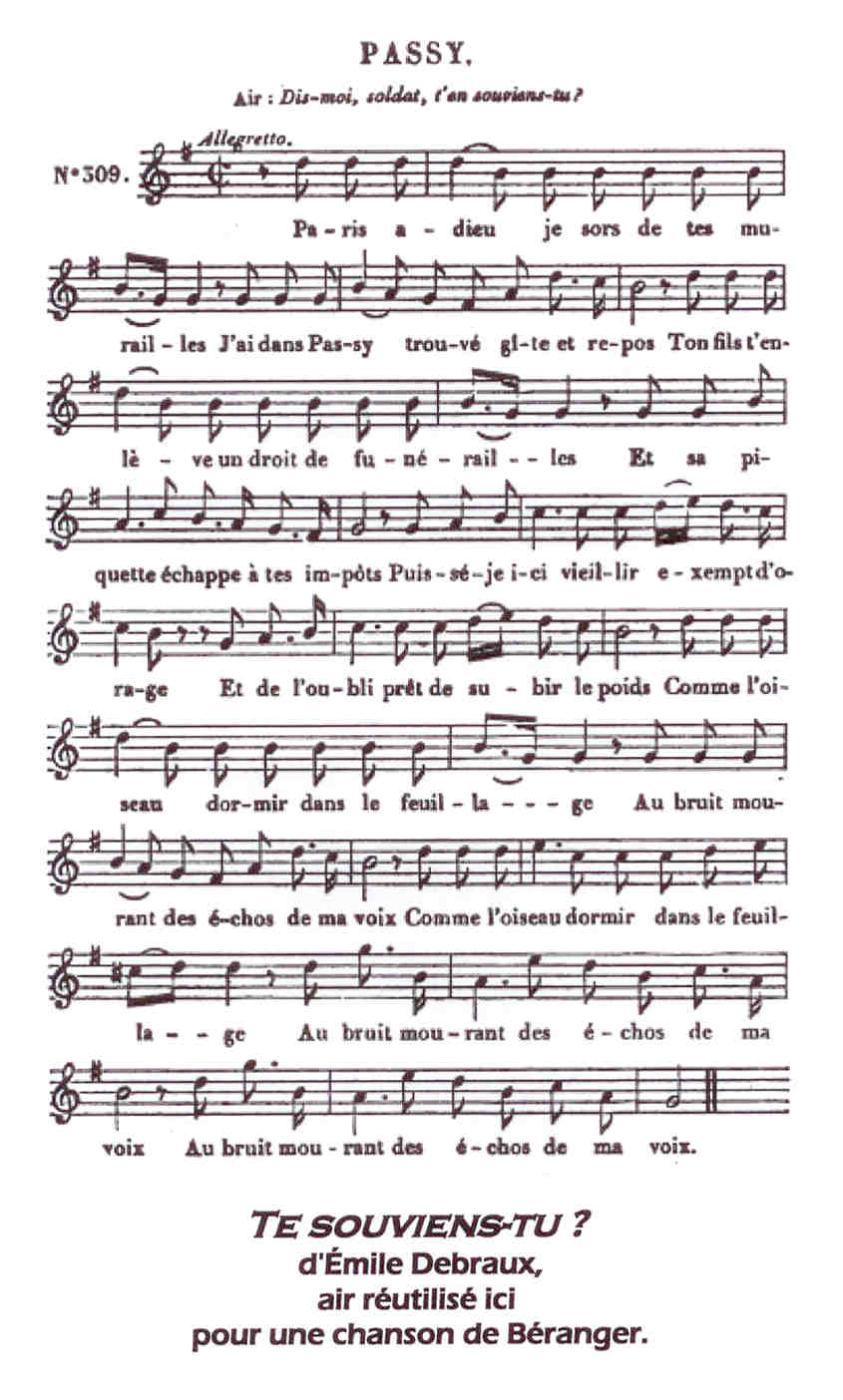|
Émile Debraux
Paul Émile Debraux (30 August 1796 – 12 February 1831), commonly known simply as Émile Debraux, was a French writer, goguettier, poet and singer. He was born in Ancerville, Meuse and died 1831 in Paris. One of his better-known songs was '' Te souviens-tu?'' (1817) about two veterans of the Napoleonic Wars {{Infobox military conflict , conflict = Napoleonic Wars , partof = the French Revolutionary and Napoleonic Wars , image = Napoleonic Wars (revision).jpg , caption = Left to right, top to bottom:Battl ... encountering each other in the street, composed during the Allied Occupation of France following the country's defeat. Notes French chansonniers 19th-century French singers 19th-century French poets 1796 births 1831 deaths People from Meuse (department) Burials at Père Lachaise Cemetery {{France-writer-stub ... [...More Info...] [...Related Items...] OR: [Wikipedia] [Google] [Baidu] |
Fructidor
Fructidor () is the twelfth month in the French Republican Calendar. The month was named after the Latin word ''fructus'' 'fruit'. Fructidor is the third month of the summer quarter (''mois d'été''). By the Gregorian calendar, Fructidor starts on either August 18 or August 19 and ends exactly thirty days later, on September 16 or September 17. Fructidor follows the month of Thermidor and precedes the Sansculottides. The month is often used as a shorthand term for the Coup of 18 Fructidor. Day name table Like all French Republican months, Fructidor lasted thirty days and was divided into three weeks called decades (''décades'') which each lasted ten days. Within every decade, each day had the name of an agricultural plant, except the fifth - the ''Quintidi'' - which had the name of an animal Animals are multicellular, eukaryotic organisms in the Biology, biological Kingdom (biology), kingdom Animalia (). With few exceptions, animals heterotroph, consume organi ... [...More Info...] [...Related Items...] OR: [Wikipedia] [Google] [Baidu] |
Goguette
A goguette () was a singing society in France and Belgium, and its members were called ''goguettiers''. As well as providing venues for informal solo and ensemble singing, goguettes also served as places for drinking, socialising, and recreation. Goguettes can trace their history back to 1729 and the "'' Société du Caveau''" in Paris, founded by poet and chansonnier Pierre Gallet (1698–1757), but their heyday was in the years 1818 to 1900. They can still be found today. In the early 19th century, goguettes met in the premises of cafés and restaurants, and provided a space for their members (for a small fee) to sing in public or to have their own compositions sung. Songs would explore well-worn epicurean themes such as drinking and eating, though political and social songs also played an important part. Open to all social ranks, in practice they tended to attract literate men from the artisan class; they were also associated with revolutionary politics and were carefully mon ... [...More Info...] [...Related Items...] OR: [Wikipedia] [Google] [Baidu] |
Ancerville, Meuse
Ancerville () is a commune in the Meuse department in the Grand Est region in northeastern France. Population See also * Communes of the Meuse department The following is a list of the 499 Communes of France, communes of the Meuse (department), Meuse Departments of France, department of France. The communes cooperate in the following Communes of France#Intercommunality, intercommunalities (as of ... References Communes of Meuse (department) {{Meuse-geo-stub ... [...More Info...] [...Related Items...] OR: [Wikipedia] [Google] [Baidu] |
Meuse (department)
Meuse () is a department in northeast France, named after the River Meuse. Meuse is part of the current region of Grand Est and is landlocked and borders by the French departments of Ardennes, Marne, Haute-Marne, Vosges, Meurthe-et-Moselle, and Belgium to the north. Parts of Meuse belong to Parc naturel régional de Lorraine. It had a population of 184,083 in 2019.Populations légales 2019: 55 Meuse INSEE Front lines in during ran varying courses through the department and it hosted an important battle/offensive in 1916 ... [...More Info...] [...Related Items...] OR: [Wikipedia] [Google] [Baidu] |
Te Souviens-tu?
''Te souviens-tu?'' () is a French song composed in 1817 with lyrics by Émile Debraux and music by . A variation was produced by Pierre-Jean de Béranger. It is also known under the title ''T'en souviens-tu?''. Composed during the Seventh Coalition's occupation of France following its defeat in the Hundred Days, it describes a former officer of the Grande Armée running into an old comrade who once saved his life begging in the streets. He sings of the glories once achieved by Napoleon's troops in their past campaigns. Lyrics Other versions The melody for ''Te souviens-tu?'' would later be used for the German anti-war song ' ("I am a soldier, but I do not like it"), written in 1870 by Max Kegel. In 1870, a satirical song called '' Paris pour un beefsteak'' was also composed using the same music during the Siege of Paris.Rifkin p.194 From this song, Joseph-Denis Doche's tune was taken up and still used today for two Walloon songs that are very well known in dialectal Wall ... [...More Info...] [...Related Items...] OR: [Wikipedia] [Google] [Baidu] |
Napoleonic Wars
{{Infobox military conflict , conflict = Napoleonic Wars , partof = the French Revolutionary and Napoleonic Wars , image = Napoleonic Wars (revision).jpg , caption = Left to right, top to bottom:Battles of Battle of Austerlitz, Austerlitz, Fall of Berlin (1806), Berlin, Battle of Friedland, Friedland, Battle of Aspern-Essling, Aspern-Essling, French occupation of Moscow, Moscow, Battle of Leipzig, Leipzig and Battle of Paris (1814), Paris , date = {{start and end dates, 1803, 5, 18, 1815, 11, 20, df=yes({{Age in years, months, weeks and days, month1=05, day1=18, year1=1803, month2=11, day2=20, year2=1815) , place = Atlantic Ocean, Caucasus, Europe, French Guiana, Mediterranean Sea, North Sea, West Indies, Ottoman Egypt, Egypt, East Indies. , result = Coalition victory , combatant1 = Coalition forces of the Napoleonic Wars, Coalition forces:{{flagcountry, United Kingdom of Great Britain and ... [...More Info...] [...Related Items...] OR: [Wikipedia] [Google] [Baidu] |
Allied Occupation Of France
An alliance is a relationship among people, groups, or states that have joined together for mutual benefit or to achieve some common purpose, whether or not an explicit agreement has been worked out among them. Members of an alliance are called allies. Alliances form in many settings, including political alliances, military alliances, and business alliances. When the term is used in the context of war or armed struggle, such associations may also be called allied powers, especially when discussing World War I or World War II. A formal military alliance is not required to be perceived as an ally—co-belligerence, fighting alongside someone, is enough. According to this usage, allies become so not when concluding an alliance treaty but when struck by war. When spelled with a capital "A", "Allies" usually denotes the countries who fought together against the Central Powers (German Empire, Austria-Hungary, and Ottoman Empire) in World War; I (the Allies of World War&nbs ... [...More Info...] [...Related Items...] OR: [Wikipedia] [Google] [Baidu] |
French Chansonniers
French may refer to: * Something of, from, or related to France ** French language, which originated in France ** French people, a nation and ethnic group ** French cuisine, cooking traditions and practices Arts and media * The French (band), a British rock band * "French" (episode), a live-action episode of ''The Super Mario Bros. Super Show!'' * ''Française'' (film), a 2008 film * French Stewart (born 1964), American actor Other uses * French (surname), a surname (including a list of people with the name) * French (tunic), a type of military jacket or tunic * French's, an American brand of mustard condiment * French (catheter scale), a unit of measurement * French Defence, a chess opening * French kiss, a type of kiss See also * France (other) * Franch, a surname * French Revolution (other) * French River (other), several rivers and other places * Frenching (other) * Justice French (other) Justice French may refer to: * C. G ... [...More Info...] [...Related Items...] OR: [Wikipedia] [Google] [Baidu] |
19th-century French Singers
The 19th century began on 1 January 1801 (represented by the Roman numerals MDCCCI), and ended on 31 December 1900 (MCM). It was the 9th century of the 2nd millennium. It was characterized by vast social upheaval. Slavery was Abolitionism, abolished in much of Europe and the Americas. The First Industrial Revolution, though it began in the late 18th century, expanded beyond its British homeland for the first time during the 19th century, particularly remaking the economies and societies of the Low Countries, France, the Rhineland, Northern Italy, and the Northeastern United States. A few decades later, the Second Industrial Revolution led to ever more massive urbanization and much higher levels of productivity, profit, and prosperity, a pattern that continued into the 20th century. The Catholic Church, in response to the growing influence and power of modernism, secularism and materialism, formed the First Vatican Council in the late 19th century to deal with such problems an ... [...More Info...] [...Related Items...] OR: [Wikipedia] [Google] [Baidu] |





